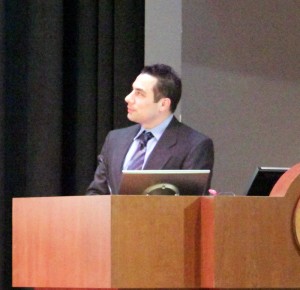White Like Me: On White Privilege

Professor Paul Calarco lectured on racial inequality and the advantages of being white in America on Wednesday, Feb. 19.
Calarco’s lecture was based on a documentary called “White Like Me: Race, Racism, and Privilege in America.”
This 2013 documentary is based on Tim Wise’s book of the same name, which was published in 2005.
Wise has been an anti-racism activist since his college years at Tulane University, where he participated in a protest against the school for investing in companies that did business with the apartheid regime in South Africa.
The title of the documentary is a reference to John Howard Griffin’s study called “Black Like Me,” where Griffin darkened his skin in the 1950s to experience life as an African American.
In the documentary, Wise said, “Instead of asking what it’s like to be black, what if we asked what it’s like to be white?”
“Whether we want to acknowledge it or not, this kind of systematic white privilege and race based favoritism is built into the very foundation of the country,” said Wise.
After noting how the topic was one that is often uncomfortable, especially for white people, Professor Calarco asked, “Do you have privilege? It is an interesting and intriguing question.”
Calarco spoke about how there are still many prevalent negative racial stereotypes that minorities must often deal with.
“We’re not only less likely to be harassed by police when we are innocent, but we are more likely to get away with it when we are guilty,” Wise said.
The documentary went through the history of racial discrimination and the hardships that African Americans have endured. Unemployment and federal housing insurances in the New Deal legislation of the 1930s largely excluded African Americans.
Racial disparities have continued to the present.
The median wealth of whites in America is twenty times greater than that of African Americans. High rates of imprisonment that followed the “war on drugs” policies have disproportionately affected African Americans.
African Americans have a lower life expectancy which is due to a lower rate of access to health care.
The documentary included a segment about how many white people are unsympathetic to the struggles of African Americans. It is believed by some that equality has been achieved and that that programs such as Affirmative Action lead to reverse discrimination against whites.
Calarco discussed the implications of Barack Obama’s election in 2008, as Wise did in the documentary. Many media outlets said that electing an African American president meant we are in a post-racial age. However, Wise noted that in some southern states, such Mississippi and Alabama, Obama only received about 10 percent of the white vote.
Calarco’s message reflected that of Wise, emphasizing that it is important to understand the history and ongoing nature of racial discrimination as well as exploring the biases we may have ourselves.
“We need to have awareness about how racism, racial conditioning and prejudice have affected us as white folks,” said Wise.
